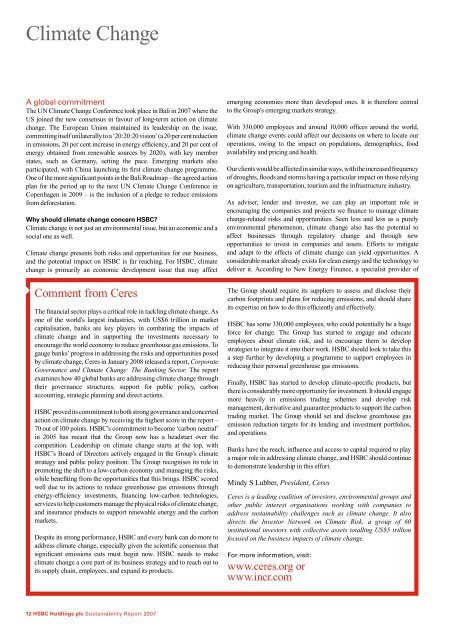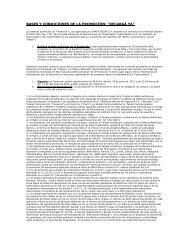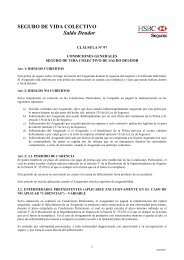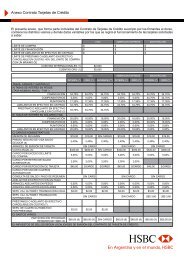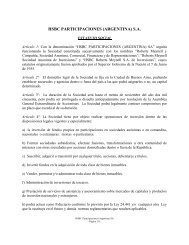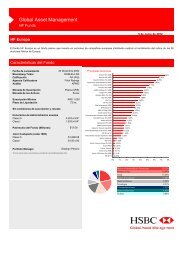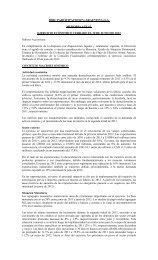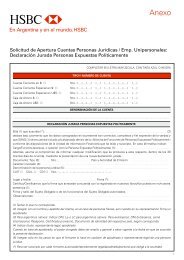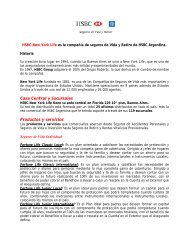HSBC Holdings plc Sustainability Report 2007
HSBC Holdings plc Sustainability Report 2007
HSBC Holdings plc Sustainability Report 2007
Create successful ePaper yourself
Turn your PDF publications into a flip-book with our unique Google optimized e-Paper software.
Climate Change<br />
A global commitment<br />
The UN Climate Change Conference took place in Bali in <strong>2007</strong> where the<br />
US joined the new consensus in favour of long-term action on climate<br />
change. The European Union maintained its leadership on the issue,<br />
committing itself unilaterally to a ‘20:20:20 vision’ (a 20 per cent reduction<br />
in emissions, 20 per cent increase in energy efficiency, and 20 per cent of<br />
energy obtained from renewable sources by 2020), with key member<br />
states, such as Germany, setting the pace. Emerging markets also<br />
participated, with China launching its first climate change programme.<br />
One of the more significant points in the Bali Roadmap – the agreed action<br />
plan for the period up to the next UN Climate Change Conference in<br />
Copenhagen in 2009 – is the inclusion of a pledge to reduce emissions<br />
from deforestation.<br />
Why should climate change concern <strong>HSBC</strong>?<br />
Climate change is not just an environmental issue, but an economic and a<br />
social one as well.<br />
Climate change presents both risks and opportunities for our business,<br />
and the potential impact on <strong>HSBC</strong> is far reaching. For <strong>HSBC</strong>, climate<br />
change is primarily an economic development issue that may affect<br />
Comment from Ceres<br />
The financial sector plays a critical role in tackling climate change. As<br />
one of the world’s largest industries, with US$6 trillion in market<br />
capitalisation, banks are key players in combating the impacts of<br />
climate change and in supporting the investments necessary to<br />
encourage the world economy to reduce greenhouse gas emissions. To<br />
gauge banks’ progress in addressing the risks and opportunities posed<br />
by climate change, Ceres in January 2008 released a report, Corporate<br />
Governance and Climate Change: The Banking Sector. The report<br />
examines how 40 global banks are addressing climate change through<br />
their governance structures, support for public policy, carbon<br />
accounting, strategic planning and direct actions.<br />
<strong>HSBC</strong> proved its commitment to both strong governance and concerted<br />
action on climate change by receiving the highest score in the report –<br />
70 out of 100 points. <strong>HSBC</strong>’s commitment to become ‘carbon neutral’<br />
in 2005 has meant that the Group now has a headstart over the<br />
competition. Leadership on climate change starts at the top, with<br />
<strong>HSBC</strong>’s Board of Directors actively engaged in the Group’s climate<br />
strategy and public policy position. The Group recognises its role in<br />
promoting the shift to a low-carbon economy and managing the risks,<br />
while benefiting from the opportunities that this brings. <strong>HSBC</strong> scored<br />
well due to its actions to reduce greenhouse gas emissions through<br />
energy-efficiency investments, financing low-carbon technologies,<br />
services to help customers manage the physical risks of climate change,<br />
and insurance products to support renewable energy and the carbon<br />
markets.<br />
Despite its strong performance, <strong>HSBC</strong> and every bank can do more to<br />
address climate change, especially given the scientific consensus that<br />
significant emissions cuts must begin now. <strong>HSBC</strong> needs to make<br />
climate change a core part of its business strategy and to reach out to<br />
its supply chain, employees, and expand its products.<br />
emerging economies more than developed ones. It is therefore central<br />
to the Group’s emerging markets strategy.<br />
With 330,000 employees and around 10,000 offices around the world,<br />
climate change events could affect our decisions on where to locate our<br />
operations, owing to the impact on populations, demographics, food<br />
availability and pricing and health.<br />
Our clients would be affected in similar ways, with the increased frequency<br />
of droughts, floods and storms having a particular impact on those relying<br />
on agriculture, transportation, tourism and the infrastructure industry.<br />
As adviser, lender and investor, we can play an important role in<br />
encouraging the companies and projects we finance to manage climate<br />
change-related risks and opportunities. Seen less and less as a purely<br />
environmental phenomenon, climate change also has the potential to<br />
affect businesses through regulatory change and through new<br />
opportunities to invest in companies and assets. Efforts to mitigate<br />
and adapt to the effects of climate change can yield opportunities. A<br />
considerable market already exists for clean energy and the technology to<br />
deliver it. According to New Energy Finance, a specialist provider of<br />
The Group should require its suppliers to assess and disclose their<br />
carbon footprints and plans for reducing emissions, and should share<br />
its expertise on how to do this efficiently and effectively.<br />
<strong>HSBC</strong> has some 330,000 employees, who could potentially be a huge<br />
force for change. The Group has started to engage and educate<br />
employees about climate risk, and to encourage them to develop<br />
strategies to integrate it into their work. <strong>HSBC</strong> should look to take this<br />
a step further by developing a programme to support employees in<br />
reducing their personal greenhouse gas emissions.<br />
Finally, <strong>HSBC</strong> has started to develop climate-specific products, but<br />
there is considerably more opportunity for investment. It should engage<br />
more heavily in emissions trading schemes and develop risk<br />
management, derivative and guarantee products to support the carbon<br />
trading market. The Group should set and disclose greenhouse gas<br />
emission reduction targets for its lending and investment portfolios,<br />
and operations.<br />
Banks have the reach, influence and access to capital required to play<br />
a major role in addressing climate change, and <strong>HSBC</strong> should continue<br />
to demonstrate leadership in this effort.<br />
Mindy S Lubber, President, Ceres<br />
Ceres is a leading coalition of investors, environmental groups and<br />
other public interest organisations working with companies to<br />
address sustainability challenges such as climate change. It also<br />
directs the Investor Network on Climate Risk, a group of 60<br />
institutional investors with collective assets totalling US$5 trillion<br />
focused on the business impacts of climate change.<br />
For more information, visit:<br />
www.ceres.org or<br />
www.incr.com<br />
12 <strong>HSBC</strong> <strong>Holdings</strong> <strong>plc</strong> <strong>Sustainability</strong> <strong>Report</strong> <strong>2007</strong>


